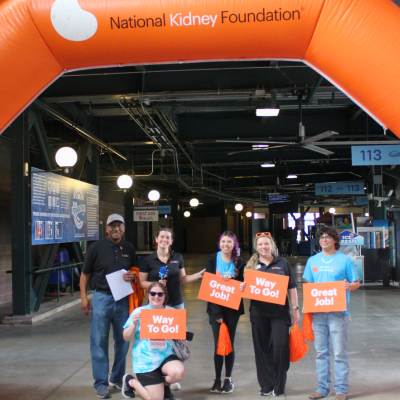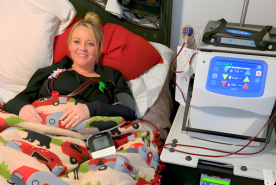May 22, 2025
Patient voices matter. See how NKF’s KidneyCARE Study™ is changing kidney disease research by focusing on real-life experiences and long-term data
A New Kidney Disease Registry
Patient registries are powerful tools that help improve care and outcomes for people with a disease. National Kidney Foundation’s (NKF) KidneyCARE (Community Access to Research Equity) Study™, a kidney disease registry, uses real-world data to understand the patient experience and slow disease progression.
To explain how it works and why it matters, we spoke with:
- Dr. Kerry Willis, NKF’s Chief Scientific Officer
- Dr. Sandy Gilbert, NKF’s Senior Director of Patient Outcomes Research
- Rachel Claudin, NKF Director of Patient-Centered Research
- Cari Maxwell, NKF advocate, study adviser, and participant
The Power of Patient Registries
Listen to "KidneyCare Study: One Year Update" on Spotify or Amazon Music.
A patient registry is a system that collects and analyzes data on a specific group of people over time. A well-known example is the Framingham Heart Study, a groundbreaking longitudinal observational study that began in 1948 and continues to this day.
Let’s break down what that means:
- Cohort: A group of people with something in common, like the same disease or age.
- Longitudinal: Collects data over months or years, not just once.
- Observational: Researchers observe; they don’t assign treatments.
“For the first time, high blood pressure, high cholesterol, smoking, obesity, and diabetes were identified as independent risk factors for heart disease,” said Dr. Willis. “This study significantly impacted the longevity of people in the U.S. and worldwide.”
The KidneyCARE Study™ aims to do the same for kidney disease.
Subscribe today!
Join the NKF Blog Newsletter
Get inspirational stories and kidney disease resources delivered to your inbox every month. You'll gain practical insights and expert advice to help you better understand and manage your kidney health, no matter where you are on your kidney journey.
The KidneyCARE Study™
The KidneyCARE Study™ is a patient registry for people with kidney disease.
This includes:
- All causes and stages of kidney disease
- People on dialysis
- Those with a kidney transplant
“Participants share their medical history, family history, and lifestyle factors,” said Dr. Gilbert. “This information helps researchers better understand kidney disease and develop better treatments.”
All information collected is de-identified and securely protected.
“All identifying details are removed and not shared with researchers. We’re looking at trends, not the individual,” said Rachel Claudin. “The KidneyCARE Study™ also meets the standard of security for health information. It is highly protected.”
How the KidneyCARE Study™ Works
The KidneyCARE Study™ collects clinical data and patient-reported outcomes, focusing on people’s day-to-day lives.
“We’re not just collecting clinical data,” said Dr. Willis. “We’re also gathering information directly from patients about how they feel and function.”
This approach offers a more complete picture of what life with kidney disease is like—and what might help slow its progression.
“Our platform has also grown beyond research,” Dr. Willis said. “It’s now a place where patients can stay up to date on advances in kidney health, find and join new clinical trials, and access peer support through NKF.”
How to join the KidneyCARE Study™:
- Sign up: Create an account, verify your email, and sign the consent form.
- Tell us about your experience: Complete a survey with questions about your experience with kidney disease.
- Check back in: Complete short follow-up surveys every six months.
- Get resources: Get educational and clinical trial updates related to your condition.
“I chose to join the KidneyCARE Study™ as a participant and committee member because I’ve experienced the power of a clinical trial. Research truly changes lives,” Carrie said. “But change only happens if enough of us are willing to share our experiences.”



















